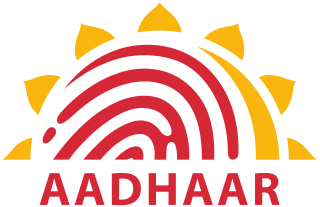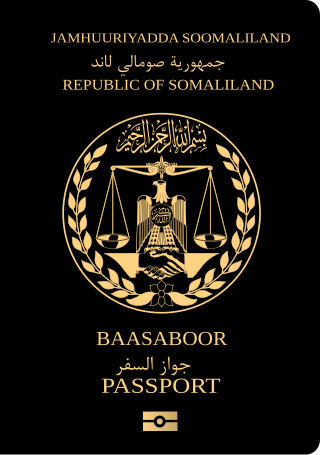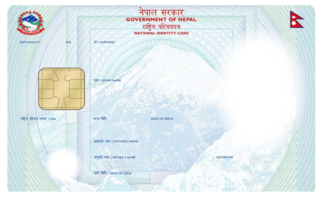
An identity document is a document proving a person's identity.

The Identity Cards Act 2006 was an Act of the Parliament of the United Kingdom that was repealed in 2011. It created National Identity Cards, a personal identification document and European Economic Area travel document, which were voluntarily issued to British citizens. It also created a resident registry database known as the National Identity Register (NIR), which has since been destroyed. In all around 15,000 National Identity Cards were issued until the act was repealed in 2011. The Identity Card for Foreign nationals was continued in the form of Biometric Residence Permits after 2011 under the provisions of the UK Borders Act 2007 and the Borders, Citizenship and Immigration Act 2009.
In electoral systems, voter registration is the requirement that a person otherwise eligible to vote must register on an electoral roll, which is usually a prerequisite for being entitled or permitted to vote.

An electronic identification ("eID") is a digital solution for proof of identity of citizens or organizations. They can be used to view to access benefits or services provided by government authorities, banks or other companies, for mobile payments, etc. Apart from online authentication and login, many electronic identity services also give users the option to sign electronic documents with a digital signature.
A national identification number, national identity number, or national insurance number or JMBG/EMBG is used by the governments of many countries as a means of tracking their citizens, permanent residents, and temporary residents for the purposes of work, taxation, government benefits, health care, and other governmentally-related functions.

The National Database & Registration Authority (NADRA) is an independent and autonomous agency under the control of the Interior Secretary of Pakistan that regulates Government Databases and statistically manages the sensitive registration database of all the National Citizens of Pakistan. Lieutenant General Muhammad Munir Afsar serves as Chairman of National Database and Registration Authority (NADRA) Pakistan.

The Albanian identity card (Letërnjoftim) is a national identity card issued by Albanian authorities to Albanian citizens. It is proof of identity, citizenship and residence. The current version is in ID1 format and biometric. The ID card is compulsory for citizens over 16 years of age, costs 1,500 lekë and is valid for 10 years.

Aadhaar (Hindi: आधार, lit. 'base, foundation') is a twelve-digit unique identity number that can be obtained voluntarily by all residents of India, based on their biometrics and demographic data. The data is collected by the Unique Identification Authority of India (UIDAI), a statutory authority established in January 2016 by the Government of India, under the jurisdiction of the Ministry of Electronics and Information Technology, following the provisions of the Aadhaar (Targeted Delivery of Financial and other Subsidies, benefits and services) Act, 2016.

The Bulgarian identity card is a compulsory identity document issued in Bulgaria. The document is issued by the police on behalf of the Ministry of Interior and is the main form of identification on the territory of the Republic of Bulgaria. All Bulgarians are obliged by law to carry their identity cards with them at all times and are subject to fines should they not.

The Somaliland passport is the passport issued to citizens of the unrecognized country of Somaliland for international travel. A passport was issued for the first time in 1996, and a biometric passport was in 2014, in line with new global standards and the requirements of the International Civil Aviation Organization.

A voter identification law is a law that requires a person to show some form of identification in order to vote. In some jurisdictions requiring photo IDs, voters who do not have photo ID often must have their identity verified by someone else or sign a Challenged Voter Affidavit in order to receive a ballot to vote.

The Ghana Card is the national Identity card that is issued by the Ghanaian authorities to Ghanaian citizens – both resident and non-resident, legal and permanent residents of foreign nationals. It is proof of identity, citizenship and residence of the holder. The current version is in ID1 format and biometric. It is issued by the National Identification Authority of Ghana and Regarded as a property of the country as such. In July 2023, through the initiative of the Vice President, Dr. Mahamudu Bawumia, new card numbers were issued to newborn babies as part of pilot program to incorporate newborn babies unto the database.
Biometrics refers to the automated recognition of individuals based on their biological and behavioral characteristics, not to be confused with statistical biometrics; which is used to analyse data in the biological sciences. Biometrics for the purposes of identification may involve DNA matching, facial recognition, fingerprints, retina and iris scanning, voice analysis, handwriting, gait, and even body odor.

National identity cards are identity documents issued to citizens of most European Union and European Economic Area (EEA) member states, with the exception of Denmark and Ireland. As a new common identity card model replaced the various formats in use from 2 August 2021, recently issued ID cards are harmonized across the EEA, while older ID cards are currently being phased out according to Regulation (EU) 2019/1157.

The Ukrainian identity card or passport of the citizen of Ukraine is an identity document issued to citizens of Ukraine. Every Ukrainian citizen aged 14 or above that permanently resides in Ukraine must possess an identity card issued by the State Migration Service. Ukrainian identity cards can be used as a travel document to enter Ukraine, Georgia, Moldova, Russia and Turkey.
National Identity Management Commission (NIMC) is a statutory Nigerian organization that operates the country's national identity management systems. It was established by the NIMC Act No. 23 of 2007 to create, operate and manage Nigeria's national identity card database, integrate the existing identity database in government institutions, register individuals and legal residents, assign a unique national identification number and introduce general multi-purpose cards.
The National Identity Card or NID card is a compulsory identity document issued to every Bangladeshi citizen upon turning 18 years of age by Bangladesh Election Commission (EC). The NID is also a biometric, microchip embedded smart identity card. The NID is required by Bangladeshi citizens for multiple essential public services & private services in Bangladesh. Initially, paper-based laminated NID cards were issued in 2006. Then, the paper-based laminated NID cards were replaced by the Smart NID cards in 2016. This was done to ensure security for the cardholder as well as prevent counterfeiting and fraudulence. Bangladesh government provides the Smart NID card with zero cost for all above 14 years Bangladeshi citizens.

The Philippine Identification System ID, also known as the Philippine Identification Card or simply the national ID, is the official national identity card for Filipino citizens worldwide and foreign permanent residents in the Philippines. The document is a significant part of the Philippine Identification System (PhilSys), the national identification system to be implemented by the Philippine government.

National Identity Card of Nepal is a federal level Identity card with unique identity number for each person that can be obtained by citizens of Nepal, based on their biometric and demographic data. The data is collected by the Department of National ID and Civil Registration (DONIDCR), under the jurisdiction of Home ministry. The contract to process and deliver the cards was signed in 2018 with IDEMIA.












